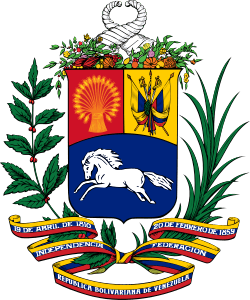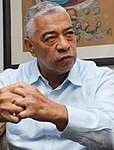1993 Venezuelan general election
General elections were held in Venezuela on 5 December 1993.[1] The presidential elections were won by Rafael Caldera of National Convergence, who received 30.5% of the vote.[2] Democratic Action remained the largest party in the Chamber of Deputies and Senate, which were elected on separate ballots for the first time.[3] Voter turnout was 60.2%, the lowest since World War II.[4]
| |||||||||||||||||||||||||||||||||||||||||||||||||
| Turnout | 60.2% | ||||||||||||||||||||||||||||||||||||||||||||||||
|---|---|---|---|---|---|---|---|---|---|---|---|---|---|---|---|---|---|---|---|---|---|---|---|---|---|---|---|---|---|---|---|---|---|---|---|---|---|---|---|---|---|---|---|---|---|---|---|---|---|
| |||||||||||||||||||||||||||||||||||||||||||||||||
| |||||||||||||||||||||||||||||||||||||||||||||||||
 |
|---|
| This article is part of a series on the politics and government of Venezuela |
|
Executive
|
|
Legislature
|
|
Judiciary |
|
|
|
|
Background
The election campaign was dominated by the corruption charges brought against sitting President Carlos Andrés Pérez, which led to his impeachment on 20 May 1993. He was replaced by Octavio Lepage as Acting President until Ramón José Velásquez was elected by Congress as interim President on 5 June. An atmosphere of economic and political crisis prevailed, with general economic problems compounded by a banking crisis, and a declining legitimacy of the traditional main parties, Democratic Action and Copei. The previous year had seen two coup attempts in February and November, reflecting widespread popular discontent with the political establishment.
Rafael Caldera, founder of Copei, rejected his old party and led a "National Convergence" of 17 smaller parties - including the Movement for Socialism, the Democratic Republican Union, the People's Electoral Movement and the Communist Party of Venezuela. His campaign promises included pardoning the 1992 coup plotters, including Hugo Chávez.
The Congressional elections were the first held under a mixed member proportional representation system,[5] modelled on the German system, with some variations.[6] The traditionally dominant Democratic Action and Copei "supported it because it looked the most like the system under which they had prospered".[5] The MMP system continued to use the old formula of assigning seats to states based on multiplying the total population by 0.55%, with a minimum of three deputies from each state (thus over-representing sparsely populated states).[5] Half each state's seats were then elected in single seat districts, and the remainder by closed party list. Parties could receive up to five additional seats based on their national vote total, to provide greater proportionality.[7]
Results
President
| Candidate | Party | Votes | % |
|---|---|---|---|
| Rafael Caldera | National Convergence | 1,710,722 | 30.5 |
| Claudio Fermín | Democratic Action | 1,326,287 | 23.6 |
| Oswaldo Álvarez Paz | Copei | 1,276,506 | 22.7 |
| Andrés Velásquez | Radical Cause | 1,232,653 | 21.9 |
| Modesto Rivero | Authentic Renewal Organisation | 20,814 | 0.4 |
| Nelso Ojeda Valenzuela | FPI | 18,690 | 0.3 |
| Luis Alberto Machado | RDLI | 6,851 | 0.1 |
| Fernando Bianco | CEM | 5,590 | 0.1 |
| José Antonio Cova | New Democratic Generation | 4,937 | 0.1 |
| Gabriel Puerta Aponte | Movement for Popular Democracy | 3,746 | 0.1 |
| Rhona Otolina | Formula 1 | 3,633 | 0.1 |
| Romuló Abreu Duarte | FEVO | 1,554 | 0.0 |
| Jesús Tang | National Party | 1,251 | 0.0 |
| Blas García Núñez | PEV | 1,198 | 0.0 |
| Juán Chacín | PODIN | 981 | 0.0 |
| Carmen de González | Nationalist Civic Crusade | 866 | 0.0 |
| Felix Díaz Ortega | New Order | 780 | 0.0 |
| Temistocles Fernández | IT | 640 | 0.0 |
| Invalid/blank votes | 212,517 | – | |
| Total | 5,829,216 | 100 | |
| Registered voters/turnout | 9,688,795 | 60.2 | |
| Source: Nohlen | |||
Senate
| Party | Votes | % | Seats | +/- |
|---|---|---|---|---|
| Democratic Action | 1,165,322 | 24.1 | 16 | –6 |
| Copei | 1,103,896 | 22.8 | 14 | –6 |
| Radical Cause | 1,005,816 | 20.8 | 9 | +9 |
| National Convergence | 650,352 | 13.4 | 6 | New |
| Movement for Socialism | 526,197 | 10.9 | 5 | – |
| Authentic Renewal Organisation | 41,157 | 0.9 | 0 | 0 |
| People's Electoral Movement | 26,545 | 0.5 | 0 | 0 |
| Democratic Republican Union | 25,732 | 0.5 | 0 | 0 |
| National Integration Movement | 23,459 | 0.5 | 0 | New |
| Communist Party of Venezuela | 14,159 | 0.3 | 0 | 0 |
| Emerging People | 10,709 | 0.2 | 0 | New |
| 147 Other parties | 242,000 | 5.0 | 0 | – |
| Invalid/blank votes | 989,169 | – | – | – |
| Total | 5,829,216 | 100 | 50 | +4 |
| Registered voters/turnout | 9,688,795 | 46.3 | – | – |
| Source: Nohlen | ||||
Chamber of Deputies
| Party | Votes | % | Seats | +/- |
|---|---|---|---|---|
| Democratic Action | 1,099,728 | 23.3 | 55 | –42 |
| Copei | 1,065,512 | 22.6 | 53 | –14 |
| Radical Cause | 974,190 | 20.7 | 40 | +37 |
| National Convergence | 651,918 | 13.8 | 26 | New |
| Movement for Socialism | 509,068 | 10.8 | 24 | – |
| Authentic Renewal Organisation | 41,085 | 0.9 | 1 | –1 |
| National Integration Movement | 29,433 | 0.6 | 1 | New |
| People's Electoral Movement | 27,635 | 0.6 | 1 | –1 |
| Democratic Republican Union | 26,299 | 0.6 | 1 | –1 |
| Communist Party of Venezuela | 21,180 | 0.4 | 0 | –1 |
| Emerging People | 12,525 | 0.3 | 0 | New |
| New Democratic Generation | 252,471 | 5.4 | 1 | –5 |
| 154 other parties | 0 | – | ||
| Invalid/blank votes | 1,117,998 | – | – | – |
| Total | 5,829,216 | 100 | 203 | +2 |
| Registered voters/turnout | 9,688,795 | 60.2 | – | – |
| Source: Nohlen | ||||
Aftermath
Andrés Velásquez of Radical Cause gained 22%, and "filed complaints of irregularities, saying that officials from his party were prevented from witnessing vote counting."[8]
References
- Nohlen, D (2005) Elections in the Americas: A data handbook, Volume II, p555 ISBN 978-0-19-928358-3
- Nohlen, p582
- Nohlen, p575
- Nohlen, p556
- Crisp, BF % Rey, JC (2003) "The Sources of Electoral Reform in Venezuela", in Shugart, Matthew Soberg, and Martin P. Wattenberg, Mixed-Member Electoral Systems - The Best of Both Worlds?, Oxford: Oxford University Press, 2003. pp. 173-194(22)
- Crisp and Rey(2003:189)
- Crisp and Rey (2003:188)
- Venezuela Apparently Returns Former President to Power Los Angeles Times, 6 December 1993
.png)
